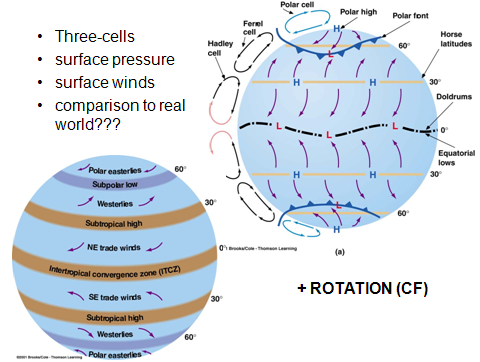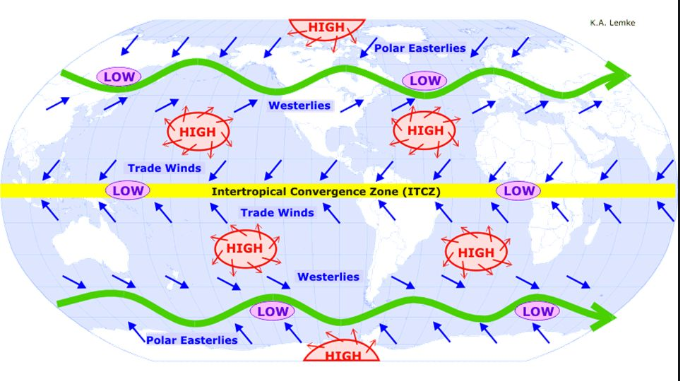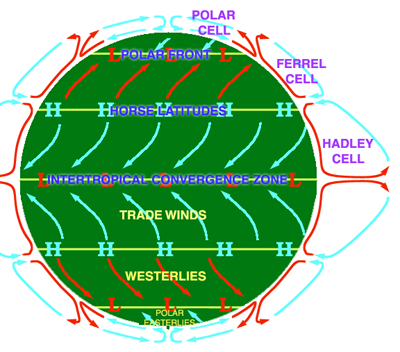You may notice that we are always looking west to see whats coming next. Often times tropical cyclones tropical depressions tropical storms and hurricanes travel from east to west.
The Temperature at which water vapor in air condenses into droplets of liquid water or.

. In this picture most of the United States lies in the yellow zone between the polar jet and the subtropical jet streams. In the US mainland its West to East. Weather patterns typically move from west to east based on a wind pattern called the jet stream.
Continental Polar Continental Tropical Maritime Polar and Maritime Tropical Air masses are the four primary air masses the continuously have an effect on the weather in the United States. The West Coast is warmer and weather systems move from warmer to colder places. Think of it this way.
This is because the the equator is moving at 1000 mph relative to the earths center the poles arent moving and the regions in-between have speeds in-between. The force called the Coriolis effect causes the direction of winds and ocean currents to be deflected. Less Dense and tends to rise.
The westerlies are important to the weather and climate in the contiguous United States. The West Coast is at a higher elevation than the East Coast and weather systems go downhill. The image shows the Earths jet streams.
MEMPHIS TN WMC In the United States most of our weather moves from west to east but in actuality systems can move in any direction. The jet stream is a narrow band of fast flowing air currents located. Prevailing winds carry weather systems to the east across most of the United States.
Elsewhere in the world they move in other directions. Why do most weather systems in the United States move from west to east. Similar to a vast river within the ocean flowing from one place to another.
These act to steer our storms and move them across the country. Based on the directions in which air moves in the jet streams how would you expect weather patterns in the United States to move. The jet stream carries weather systems along with it.
The steady flow of surface ocean water in a prevailing direction. About 2000 miles from the equator the air falls back to Earths surface blowing towards the pole and back to the equator. Cold Warm Stationary Occluded.
Weather can move in any direction. Change the Earth View between Sea Surface Temperature SST and Blue Marble to study the relationship between cloud formation and. Fig 6 Occasionally overriding high and low pressure systems can force the jet stream to do odd and unusual things such as flow to the south and back to the north flexing from Seattle Washington to.
The air eventually stops rising and spreads north and south towards the Earths poles. This segment of weather 101 focuses on storm motion and why we generally see storms move from west to east. This is why hurricanes hit the east coast of the United States.
Six of these large convection currents cover the Earth from pole to. But elsewhere in the world they move in other directions. In the Northern Hemisphere where you are presumably the weather patterns tend to not exclusively of course move west-east.
The easiest answer is the jet stream. These air masses form in their source regions and once they start to move from those source regions is when the atmospheric stability is modified. The trade winds are the most persistent winds on the planet.
In the United States the wind above our head tends to move in a direction from west to east. Which way the weather tends to move depends on your location. The United States is marked with an X.
Blocking patterns occurs when centers of high pressure andor low pressure set up over a region in such a way that they prevent other weather systems from moving through. MEMPHIS TN WMC - In the United States most of our weather moves from west to east but in actuality systems can move in any direction. Dense and tends to sink.
This is because tropical cyclones develop over warm sea waters and follow trade winds that blow westward. How do weather patterns move across the United States. The unique pattern of the jet stream is driven by the rotation of the earth.
The reason that they most often move from west to east is due to the jet stream. Suppose that in an average year your state experiences 10 winter storms. The land over the equator makes the air over the equator go nearly 1000 mph eastward.
When the blocking pattern is in place other systems are forced to go around it. El Niño does increase the chances for a wet and stormy winter and early spring overall across the southern tier of the United States but its impossible to say that any single storm was solely caused by El Niño and wouldnt have happened otherwise. In the Northern Hemisphere wind and currents are deflected toward the right in the Southern Hemisphere they are deflected to the leftDec 18 1998.
In the United States weather most often moves west to east because that is the direction the jet stream blows. US Weather Patterns and the Hadley Cell In the US Weather primarily flows from the west to the east as it follows the jet stream. They blow from the same direction more than 80 percent of the time.
4 Types of Fronts caused by colliding air masses. Weather systems can really move in any direction. From west to east.
You may notice that we are always looking west to see whats coming next. When the storms are south of us they are being steered mainly east-to-west in the low latitude flow of the tradewinds so many head in our direction from the Atlantic Ocean. The globe can basically be broken down into 6 strata in which the weather patterns tend to move in a.

In What Cases Do Weather Fronts Move From East To West Quora

Weather 5 E 1 3 A Kit By Whitney Godfrey Gimkit

Breakdown Why Weather Systems Move From West To East
![]()
What Are Trade Winds Noaa Scijinks All About Weather

Understanding And Determining Prevailing Winds Trees For Energy Conservation

/cloudfront-us-east-1.images.arcpublishing.com/gray/3XXH5O3HEJAEVEITLEUZSJ5KY4.jpg)
0 comments
Post a Comment